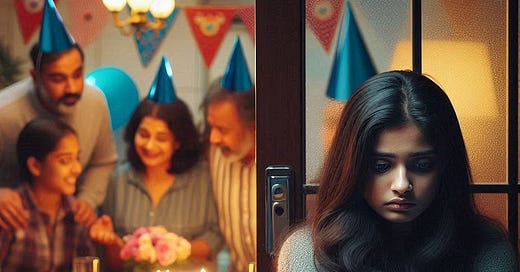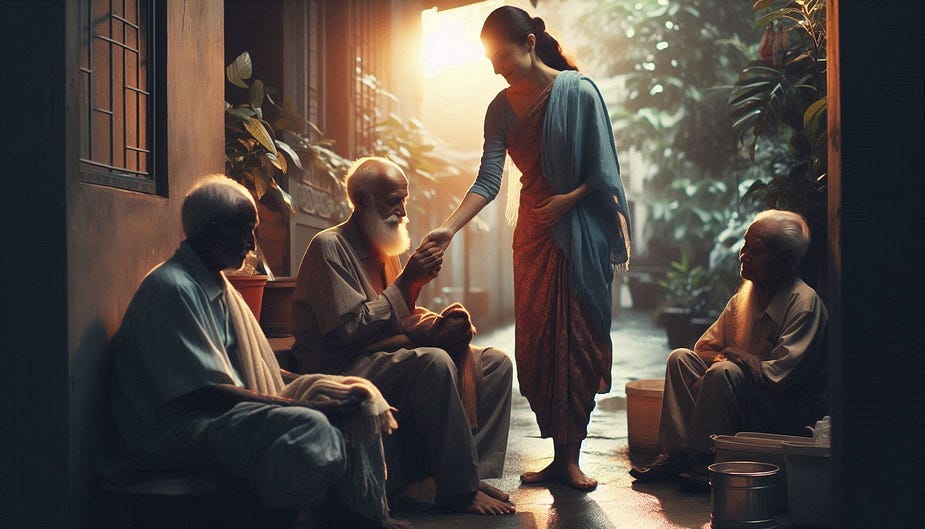Responding to Some Questions About Non-Duality
There cannot be a united family if you leave a family member outside the door
Peeling the Ego - AI Image by Author (Microsoft Designer) - Think before you create with AI
I often read questions about spirituality in general, or specifically focused on Vedanta, across various social media communities.
Some of these are:
Is it possible to reconcile spirituality with modern/worldly life?”
Is spiritual truth reserved for a select few or is it accessible to everyone?
Must we choose between modern science and ancient tradition?
Is it necessary to isolate oneself from the world to achieve spiritual enlightenment?
Is there an exclusive path to truth?
Many of these questions are centred on understanding the fundamental distinction between duality and non-duality — a core concept in Vedantic philosophy.
Drawing from my experience with Vedanta philosophy to a hypothetical listener… I would start with:
I deeply appreciate your profound questions that invite us to reflect on the relationship between modern science and ancient traditions, particularly regarding the nature of duality versus non-duality. Although I know you’re already aware, let me note that these questions presuppose a division, a contrast.
Contrasts
It’s akin to asking a child whether they love their mother or father more; aren’t we creating a separation where, in reality, there is only love? Your questions, while intelligent and stimulating, carry a seed of duality, of separation, which contrasts with the fundamental principle we’ve explored together: the idea that there is no real separation or dualism in reality, but that everything is essentially One. I make this observation only to better clarify the concept of duality and unity for our readers.
Ontologically, stating that everything is One and we’re all family, but excluding someone from our home, creates a contradiction. It means that, in the very nature of being and existence, we’re contradicting the principle of unity we claim to uphold.
Practical approach
Vedanta, the ancient Indian philosophy that I have been studying for four years, teaches us a very practical approach through three steps: first, there’s Shravana, the careful listening and reading of the principal scriptures like the Upanishads, the Bhagavad Gita, and the Brahma Sutras, just as when we study an important text with deep attention. Then comes Manana, deep reflection on what we’ve learned, as when we reconsider teaching and connect it to our personal experience. Finally, there’s Nididhyasana, where we integrate this understanding into our daily lives, transforming theoretical knowledge into lived awareness and experience.
It’s unnecessary to withdraw from the world to follow a spiritual path. Karma Yoga, for example, teaches us that we can achieve spiritual realization precisely through our daily actions, such as when we work with commitment but without obsessive attachment to results
Helping people — AI Image by Author (Microsoft Designer) — Think before you create with AI
The idea of an “enlightened morality” reserved for a select few would contradict the fundamental principle of Vedanta that everything is One, thus interconnected and without separation. Just observe how our body works: every cell collaborates with others without competition. The same happens in nature: consider how an ecosystem functions through the cooperation of all its elements.
So it’s not about escaping from the world or trying to change it by force. Rather, it’s about understanding it deeply, just as when we comprehend that every element — from the largest trees to the smallest microorganisms — has its fundamental role in a forest.
Openness
In practice, this approach invites us to live fully in the world but with a new awareness: we are not isolated beings in competition, but different expressions of a single reality. It’s like being musicians in an orchestra: each plays their instrument, but in harmony with others to create a symphony. True understanding lies in realizing there is no separation between the musician, the music, and the orchestra itself.
And…so?
Vedanta offers a philosophical, scientific, and spiritual foundation that has profoundly enriched Hinduism. It’s important to note how Hinduism itself reflects this non-dual vision in its deeply inclusive nature.
It never presents itself as an exclusive path to truth, but welcomes and dialogues with different perspectives, recognizing that many paths lead to the same mountain peak. This openness to dialogue and this capacity to include different views are practical expressions of the understanding that, at the core, there is no real separation.
“That which is the subtlest of the subtle, the greatest of the great, resides in the hearts of all beings. It cannot be seen or understood with the eyes of flesh or with a rational mind. Only when the heart is purified and the mind is quiet can the enlightened one perceive this supreme truth”
(Mundaka Upanishad, II.2.1)
Feel free to leave a comment.
I have woven tales for anyone who cares to read them. My books await you on Google Books. Check also my stories on Medium.com.
I am eager to participate in research and produce content on Cross-Cultural Philosophy. Considering the many philosophy professors following Learn Vedanta Substack from universities across the five continents, I would be truly honoured to be involved in projects, as I have been recently approached. Please feel free to contact me.
I would be honoured if you considered subscribing to the Premium Contents of my Vedanta Substack and leaving feedback, comments, and suggestions on this page and by writing to me at cosmicdancerpodcast@gmail.com.
Visit my BuyMeACoffee page.
Thanks for reading.





